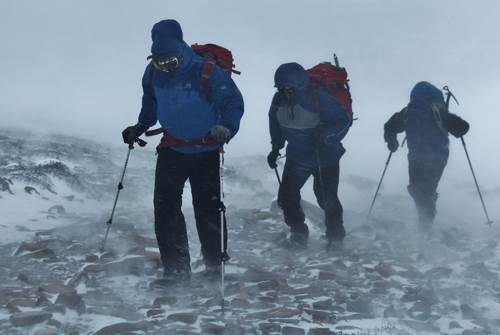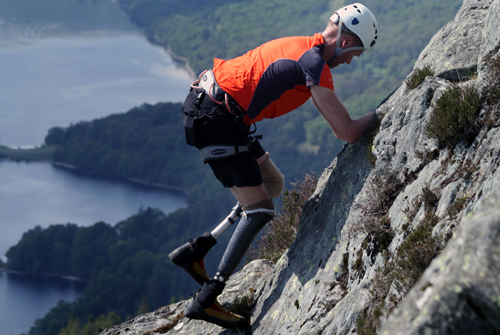We understand that every individual is unique and we love to see a really diverse range of people gaining skills and being given the opportunity to learn, lead and inspire others.
Did you know that many of our providers have made reasonable adjustments on a training or assessment course to enable a variety of individuals to learn or showcase their competence? One of the strengths of our syllabi is that they don’t specify techniques, merely competencies, and it’s possible to prove your competence in a number of ways, including using adapted techniques or occasionally additional equipment, without changing the standard of the qualification.
Here are some examples of individuals who have attended our courses:
Candidate with Spinabifida and Hydrocephalus – Climbing Wall Instructor training
The candidate was able to take part in the course fully with a little extra thought, for example supplying a chair to reduce the time spent standing. A lead fall would likely cause injury so the course director placed additional clipping points between bolts to limit potential falls and made sure the lead rope was clipped through the first draw before the candidate started to climb. An Edelrid Ohm was used to reduce the impact force of a lead fall when lead belaying and the lead climber was of a similar weight.
Candidate on the autistic spectrum - Climbing Wall Instructor training
A candidate on a Climbing Wall Instructor training course was on the autistic spectrum. The individual participated in the course fully but could not stand to be touched, which became apparent during warmup games. The other candidates were made aware and the course continued successfully.
Candidate who is profoundly deaf - Mountain Leader assessment
A candidate on a Mountain Leader assessment was profoundly deaf. As long as the candidate and the assessor made eye contact and the assessor spoke clearly and precisely (the candidate was a very good lip reader) there were no issues.
Candidate who is partially sighted - Hill and Moorland Leader training and assessment
A candidate on a Hill and Moorland Leader training course was registered partially sighted. The candidate was encouraged to try out a variety of techniques and options to enable them to competently navigate. There were two trainers working on the course which facilitated some additional support.
By the time it came to assessment, this candidate had put a lot of time into researching and working out systems to help see the map using various magnifying glasses. During the assessment the candidate elected to use the standard map with only occasional reference to the blown up one. The candidate needed extra time to take bearings, measure distance and to compare the map to the ground. The assessment was completed successfully.
Candidate with poor hearing - Winter Mountain Leader training
A candidate on a Winter Mountain Leader training course had very poor hearing that required hearing aids. This proved to be a problem for them on the windier days as they could not pick up on information unless it was directed straight at them.
The training team and other candidates adapted to this and ensured that the candidate was always in a prime position to receive instruction. The two trainers often dropped back to double check that the candidate had heard all the information and would repeat any bits they had missed.

Candidate with lower leg amputation - Winter Mountain Leader assessment
A candidate on a Winter Mountain Leader assessment course was a lower leg amputee, using a prosthesis that attached below the knee. The candidate showed remarkable grit and determination in completing the week, especially in light of the conditions encountered on the expedition. No reasonable adjustments were required.
Candidate with dyslexia - Mountain Leader assessment
A candidate on a Mountain Leader assessment identified as being dyslexic. This manifested itself in issues with numbers and short term map memory. The assessor managed this by giving the candidate space and time to check the map. The assessor also ensured that they were very clear about tasks set to the candidate.
Candidate with post-traumatic stress disorder (PTSD) - Winter Mountain Leader training
A candidate disclosed during the course that they were suffering from PTSD – this was not disclosed on the medical form. The time away from home, adverse weather and general stress of trying to acquire the required information became an issue for the candidate to the point that the candidate was concerned about being able to complete the course. The course director had a long discussion with the candidate mid-way through the course and came up with a few ideas to help them cope. These mainly involved allowing the candidate more processing time on the hill and avoiding putting them under any pressure with questions etc. which seemed to work well. The candidate was concerned about night terrors in the snow hole, which did not materialise and they completed the week.
Quadruple amputee - Mountain Leader assessment

Jamie Andrew lost both hands and feet to frostbite on a climbing trip to the French Alps in 1999. He has since become a Mountain Leader and successfully climbed the Matterhorn. Find out more about Jamie’s story in our article:
Walking without a leg to stand on
If you have a disability or medical condition that you think might affect your progress through any of our qualifications, get in touch with one of our providers to discuss your options. The more they know about you before the course, the easier it will be for them to make
reasonable adjustments if any are needed. The syllabus for each qualification determines the competencies required of all candidates and cannot be adjusted.
Feedback from our providers highlights that time and space for the candidate to work things out for themselves is often the key to a successful experience. This is because it gives the individual opportunities to explore different options and decide what works best for them.
Participation in walking, climbing and mountaineering brings not only health benefits but it also increases self-confidence and defies stereotypes about people with disabilities and disabilities in general. We therefore support our providers to include people with disabilities where appropriate into our schemes to promote the right to equality and equal opportunity for all.